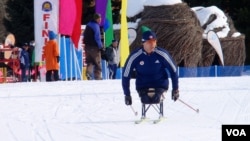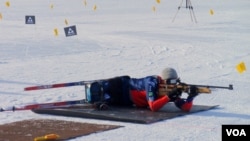KETCHUM, IDAHO —
The one-year countdown to the 2014 Winter Paralympic Games has begun.
The competition for physically disabled athletes takes place directly after the Olympic Games.
The U.S. Nordic team appears likely to be composed nearly entirely of injured military veterans, who train at several high-end ski resorts, which have become hubs of healing for veterans.
At a recent cross-country sprint-racing exhibition in the ski resort town of Ketchum, Idaho, also known as Sun Valley, spectators marveled as a one-armed ex-Marine sped by. A nearly blind former Navy linguist raced behind a sighted guide.
Numerous amputee and paraplegic veterans powered around the course solely on the strength of their arms and abs, riding a contraption aptly called a "sit-ski."
"Look at their upper bodies," said Tom Lowe, who skis recreationally. "It's amazing what these people can do. It's incredible."
One of those incredible people is former infantryman Andy Soule, now a member of the U.S. National Paralympic Team, who lost his legs in Afghanistan in 2005, after the Humvee he was patrolling in was blown up by a hidden roadside bomb.
His unlikely career path - from soldier to badly wounded warrior to full-time athlete - is made possible in part by training stipends from the U.S. Department of Veterans Affairs.
During his recuperation, Soule saw firsthand how military hospitals and the Veterans Administration increasingly emphasize sports as part of the therapy for wounded vets. One day the Texas native met a visiting ski coach from Sun Valley.
"He said that he thought that I had the ability to be a good skier," Soule says. "He thought I should come along to his development camp up here...I just figured I would give it a try. It actually has worked out real well."
Coach Marc Mast agrees. He directs a non-profit organization called the Wood River Ability Program, which specializes in adaptive sports.
"Sport has done more for Andy after traumatic injury - losing both his legs above the knee - and not knowing what he was going to do with his life after that," Mast says. "Sport made him a whole person again, more than anyone I have ever seen."
Not one, but three different non-profits based in Sun Valley seek to replicate Soule's story. Other ski towns are getting in the act too, including Winter Park, Colorado and Jericho, Vermont.
In recent years, the respective non-profits have attracted hundreds of wounded veterans to winter and summer sports clinics. Winter features Nordic and alpine skiing and sledge hockey.
Summer camps offer hand cycling, rafting, fly fishing, and even paragliding. Longtime swim coach Karen Morrison founded the newest Paralympic sport club in Sun Valley, called AquAbility.
"It's a big movement in Paralympic sports to collaborate with each other and to cross-train and get everybody involved in as many different things as possible," Morrison says. "Swimming and skiing go together real well. Same with running and swimming."
Amputee athlete Andy Soule propels himself up and down race courses using only arm power and his core. He straps himself into a molded seat that rides on a metal frame over two skinny skis. Turning the so-called "sit ski" involves leaning and skidding.
"On the sit down side of our sport, it is a sport that can be picked up fairly quickly," Soule says. "Certainly there is a lot of technique to it, but the basics can be picked up quickly by someone who has the determination and has the physical ability to do it."
There is a "back to the future" element to this. During World War II, the U.S. Navy took over Sun Valley Lodge and converted it into a convalescent center for injured combat veterans. The resort reopened to the public in 1946.
In one more historic parallel, America’s biggest rival in Paralympic Nordic competition is its old Cold War foe, Russia.
In March, Soule and several other disabled U.S. skiers and biathlon competitors will head to Sochi, Russia, for a test event taking place at the 2014 Olympic and Paralympic Games venue.
The competition for physically disabled athletes takes place directly after the Olympic Games.
The U.S. Nordic team appears likely to be composed nearly entirely of injured military veterans, who train at several high-end ski resorts, which have become hubs of healing for veterans.
At a recent cross-country sprint-racing exhibition in the ski resort town of Ketchum, Idaho, also known as Sun Valley, spectators marveled as a one-armed ex-Marine sped by. A nearly blind former Navy linguist raced behind a sighted guide.
Numerous amputee and paraplegic veterans powered around the course solely on the strength of their arms and abs, riding a contraption aptly called a "sit-ski."
"Look at their upper bodies," said Tom Lowe, who skis recreationally. "It's amazing what these people can do. It's incredible."
One of those incredible people is former infantryman Andy Soule, now a member of the U.S. National Paralympic Team, who lost his legs in Afghanistan in 2005, after the Humvee he was patrolling in was blown up by a hidden roadside bomb.
His unlikely career path - from soldier to badly wounded warrior to full-time athlete - is made possible in part by training stipends from the U.S. Department of Veterans Affairs.
During his recuperation, Soule saw firsthand how military hospitals and the Veterans Administration increasingly emphasize sports as part of the therapy for wounded vets. One day the Texas native met a visiting ski coach from Sun Valley.
"He said that he thought that I had the ability to be a good skier," Soule says. "He thought I should come along to his development camp up here...I just figured I would give it a try. It actually has worked out real well."
Coach Marc Mast agrees. He directs a non-profit organization called the Wood River Ability Program, which specializes in adaptive sports.
"Sport has done more for Andy after traumatic injury - losing both his legs above the knee - and not knowing what he was going to do with his life after that," Mast says. "Sport made him a whole person again, more than anyone I have ever seen."
Not one, but three different non-profits based in Sun Valley seek to replicate Soule's story. Other ski towns are getting in the act too, including Winter Park, Colorado and Jericho, Vermont.
In recent years, the respective non-profits have attracted hundreds of wounded veterans to winter and summer sports clinics. Winter features Nordic and alpine skiing and sledge hockey.
Summer camps offer hand cycling, rafting, fly fishing, and even paragliding. Longtime swim coach Karen Morrison founded the newest Paralympic sport club in Sun Valley, called AquAbility.
"It's a big movement in Paralympic sports to collaborate with each other and to cross-train and get everybody involved in as many different things as possible," Morrison says. "Swimming and skiing go together real well. Same with running and swimming."
Amputee athlete Andy Soule propels himself up and down race courses using only arm power and his core. He straps himself into a molded seat that rides on a metal frame over two skinny skis. Turning the so-called "sit ski" involves leaning and skidding.
"On the sit down side of our sport, it is a sport that can be picked up fairly quickly," Soule says. "Certainly there is a lot of technique to it, but the basics can be picked up quickly by someone who has the determination and has the physical ability to do it."
There is a "back to the future" element to this. During World War II, the U.S. Navy took over Sun Valley Lodge and converted it into a convalescent center for injured combat veterans. The resort reopened to the public in 1946.
In one more historic parallel, America’s biggest rival in Paralympic Nordic competition is its old Cold War foe, Russia.
In March, Soule and several other disabled U.S. skiers and biathlon competitors will head to Sochi, Russia, for a test event taking place at the 2014 Olympic and Paralympic Games venue.





